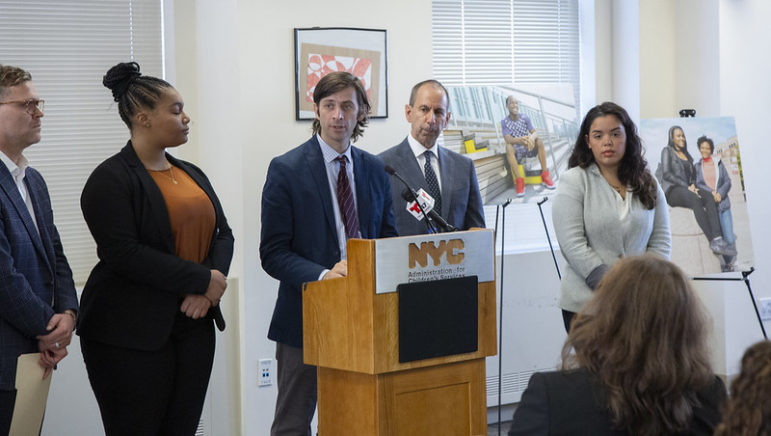‘It just isn’t fair for any young person to be denied a fundamental support system in their lives. Youth in care deserve to have this very basic need met, and the city must do its part by baselining $20 million for Fair Futures in the upcoming budget.’

John McCarten/NYC Council
City officials and advocates announcing the launch of the Fair Futures program in October 2019.Growing up in foster care is hard. Making it through the pandemic while in foster care is even harder. I entered the child welfare system at age 11. Now at 23, I’ve aged out of care, but I still witness the struggles of growing up in the system, moving from foster home to foster home, through the eyes of my four younger siblings, ages 9, 10, 13 and 17.
They are battling the trauma of being in foster care, the struggles of remote learning, and the anxiety associated with prolonged isolation, while also coping with the reality of systemic racism in the communities hit hardest by the pandemic. No one should face this all on their own. Every child and young adult deserves to have a responsible, reliable adult in their life—and young people in New York City’s child welfare system are no different.
Fortunately, New York City holds the power to ensure they don’t have to. This month marks the one year anniversary of the launch of Fair Futures, a citywide initiative with all 26 foster care agencies offering life coaches and tutors to nearly 3,000 young people, from middle school to age 26. Fair Futures offers practical and emotional support with everything from school, to the high school admissions process and financial aid applications, to navigating the inherent challenges of growing up in foster care. For the young person in care who is sick with COVID-19, or the college student suddenly faced with homelessness when their dorm closes, or the middle-schooler struggling to keep up with math on a broken laptop, having a Fair Futures coach or tutor isn’t a luxury, but an essential.
The results speak for themselves. On average, just 21 percent of youth in foster care graduate with a high school diploma by age 21. Meanwhile, over 90 percent of youth at agencies that piloted the Fair Futures model were able to meet that goal.
Despite the indisputable success of Fair Futures, funding for the citywide model is set to expire at the end of this fiscal year, leaving thousands of young people without the lifesaving support they need and deserve. But New York leaders have the power to change that during this upcoming budget cycle, by baselining the $20 million needed to ensure youth in foster care supported by Fair Futures can maintain access to the coaching and educational support systems they need for the months and years to come.
 CityViews are readers’ opinions, not those of City Limits. Add your voice today!
CityViews are readers’ opinions, not those of City Limits. Add your voice today!
My coach, Megan, has been my rock through college and now as I start my life as an independent young adult in New York City. It’s because of her and my Fair Futures tutors, Phyllis and Mitchell, that I was able to graduate college, which is only true for 3 percent of youth in foster care. Now my coach helps me with practical decisions, like securing an apartment and enrolling in health insurance, much like a parent would. She’s also the person there for me when times get tough, and cheering me on when I have something to celebrate. I can’t imagine my life without her.
The rapid implementation of Fair Futures citywide in just 12 months is significant, but there are still over 70 percent of young people in New York City’s foster care system without Fair Futures support who need it—my siblings included.
Fairness is at the core of Fair Futures’ mission (and name) for a reason. It just isn’t fair for any young person to be denied a fundamental support system in their lives. Of young people in foster care, 98 percent are Black or Latinx. The disproportionate representation of youth of color in our foster care system speaks to the moral imperative that we prioritize proven programs to address the roots of racial inequality and how it perpetuates generation to generation. New York City’s youth in care deserve to have this very basic need met, and the city must do its part by baselining $20 million for Fair Futures in the upcoming budget.
I see how being in foster care weighs on my siblings every day. I also know firsthand how having the support of Fair Futures could change their lives. Our city has a responsibility to care for the children and teenagers in foster care, who became a part of the system through no fault of their own. It’s time we made the proven model of Fair Futures a permanent fixture in our city’s child welfare system.
Ericka Francois is the Coordinator of the Fair Futures Youth Advocacy Board.








